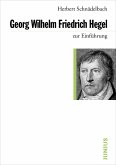English translations of Hegel s main concepts are given in alphabetical order from absolute to will
An index of German words and an index of names gives access to any given topic
Etymology of Hegel s vocabulary is given
Sheds important new light on Hegel s thought. .
This book provides a comprehensive survey of Hegel s philosophical thought via a systematic exploration of over 100 key terms, from `absolute to `will . By exploring both the etymological background of such terms and Hegel s particular use of them, Michael Inwood clarifies for the modern reader much that has been regarded as difficult and obscure in Hegel s work.
Hinweis: Dieser Artikel kann nur an eine deutsche Lieferadresse ausgeliefert werden.
An index of German words and an index of names gives access to any given topic
Etymology of Hegel s vocabulary is given
Sheds important new light on Hegel s thought. .
This book provides a comprehensive survey of Hegel s philosophical thought via a systematic exploration of over 100 key terms, from `absolute to `will . By exploring both the etymological background of such terms and Hegel s particular use of them, Michael Inwood clarifies for the modern reader much that has been regarded as difficult and obscure in Hegel s work.
Hinweis: Dieser Artikel kann nur an eine deutsche Lieferadresse ausgeliefert werden.
"One of the best reference books about a philosopher, highly recommended." Choice
"Invaluable. This book achieves what the Blackwell Philosopher Dictionary series sets out to do. It presents difficult ideas with scholarship and clarity." The Philosopher
An exceptionally clear yet rigorous and scholarly presentation of difficult ideas. This will be an indispensible guide for students of Hegel at all levels. Raymond Plant, University of Southampton
"Invaluable. This book achieves what the Blackwell Philosopher Dictionary series sets out to do. It presents difficult ideas with scholarship and clarity." The Philosopher
An exceptionally clear yet rigorous and scholarly presentation of difficult ideas. This will be an indispensible guide for students of Hegel at all levels. Raymond Plant, University of Southampton








